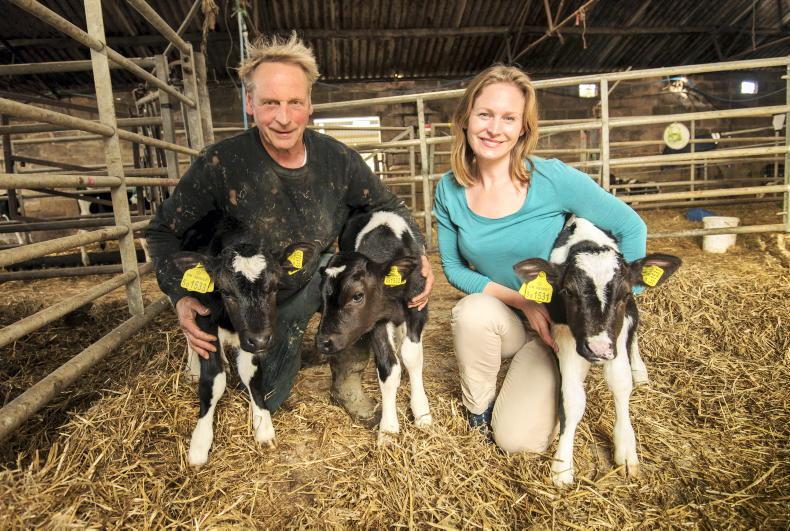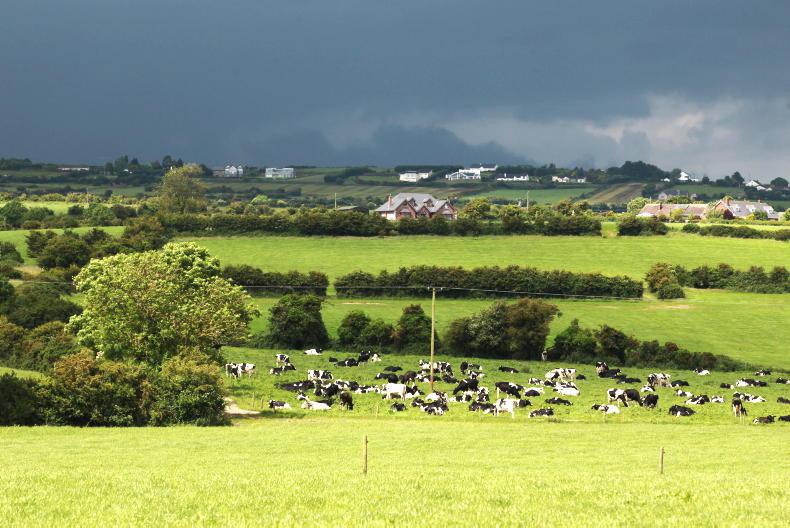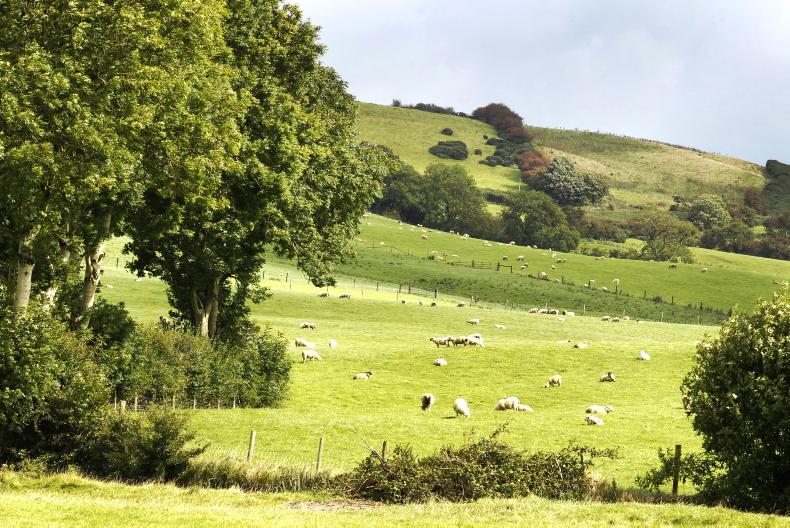We have always taken health and safety seriously on this farm. New entrants are always instructed on the safe handling of machinery, front-end loaders, how quad bikes can overturn, the safe handling of the chemicals and the dangers of going into bulk tank to scrub it out.
So, I rather surprised myself when I smashed my ribs and put myself in hospital for a week.
I hadn’t assessed the balance of a 74-year-old is not that of a 17-year-old. I was tiptoeing along - or tightrope-walking along - a sleeper wall between the slurry pit and the dirty water pit, which is the drainings from the slurry pit.
A wobbly sleeper and I fell, into 8ft of dirty water, smashing my ribs and ingesting about a pint of it. I know because I measured it when it projectile vomited six hours later.
Passing out in an A&E waiting room, I was rushed into recuss and then spent four days in the trauma ward.
I’m sure there are lessons to be learned from this incident, but it has reinforced the necessity of continually doing safety assessments in an ever-changing landscape of jobs. The mantra must be ‘think of what can go wrong, not I must do quickly’.
Fodder
There is a Chinese curse, which is "may you live in interesting times”. This autumn has certainly been interesting times.
I normally rent 100ac of grassland to top up the silage clamp. This spring, this tenure looked uncertain, so I rented 100ac elsewhere only to find that the original 100ac turned up as well.
So, with 200ac and everything providing three plentiful cuts, rather than two, I have a bursting silage clamp and no room to put in the 300t of maize that I normally buy in.

Farmers Ceri Cryer and her dad Joe Collingbourne. \ Clare Green
All us old farmers are saying that there must be something awful round the corner because when nature provides, you normally need it. The paddocks have been roaring away and we have had to shut up half of them to be wrapped, but the cost of wrap is astronomical and it's impossible to find two fine days.
I'm continually being offered 40ac or 50ac second-cut for free and I have to turn it down because it’s something which I hopefully don’t need and because of the cost of the wrap.
Although there is plentiful grass and it seems to analyse out with a good protein, the cows are not milking well. So, we’ve introduced buffer feeding silage and brewers grains and we are starting to get a response.
Bulk tank
We have had 10 days of nightmares with bactoscans in four figures. We have tried everything possible - scrubbing out the bulk tank, checking the circulation routine and two technicians in all Saturday morning. I think we eventually narrowed it down to a split liner.
We eventually spotted milk going up a transparent pulse line. Had it not been a transparent pulse line, we would have been unlikely to find it. We’re down to 38 this morning, so we’re going in the right direction.

Collingborn reports to have more fodder than needed.
On the milking front, we have an ever-changing landscape of part-time girls and after three hours milking, facing a shed full of calves can be rather daunting. So, we instituted one of them to come in separately because we’re starting to have mortality. It’s probably cryptosporidium, but we’re having tests done.
A neighbouring farmer rang me up last week. He is part of a group that supplies a major chocolate factory and the haulier contracted to collect all his milk had gone into administration. I understand 2,000 farmers throughout the UK had to throw their milk away over the weekend.
Times gone by
Before 1933, my grandfather would get up and milk his cows, put the churns on a horse and take them to the local milk factory. If there was too much milk, he took it home and fed the pigs.
In 1933, the situation was made more tenable by the formation of the Milk Marketing Board. This provided the same price for everyone and took all the milk.
It rambled on for 50 years and perhaps did become slightly cumbersome, but it fitted purpose. Then came deregulation and ‘divide and rule’ was the order of the day, with producer groups being formed with different enticements.

Safety should never be forgotten on farms, writes Joe Collingborn. \ Ramona Farrelly
The original one-stop-co-op that was formed had a choice of one co-op with no brands or several co-ops with the brands. This latter would have been the better option because the brands had been established at the farmers’ expense.
However, the one co-op, which anyway eventually morphed into three, with the result that the first one went bust, one amalgamated and the other continued.
And it’s now growing in strength to strength, under the very careful direction of the 'pocket rocket' Shelagh Hancock. It now has a waiting list of farmers wanting to join.
I’m proud to be a member of First Milk. I feel I have an evergreen contract since 1933 and although the next generation sometimes consider jumping ship for a penny more, the current transport debacle and the fact that, in times of plenty it could be last in first out, we must realise we have a perishable product which must be picked up daily.
This is a fact brought home to many over the weekend as they took their milk out in a slurry tanker.
We have always taken health and safety seriously on this farm. New entrants are always instructed on the safe handling of machinery, front-end loaders, how quad bikes can overturn, the safe handling of the chemicals and the dangers of going into bulk tank to scrub it out.
So, I rather surprised myself when I smashed my ribs and put myself in hospital for a week.
I hadn’t assessed the balance of a 74-year-old is not that of a 17-year-old. I was tiptoeing along - or tightrope-walking along - a sleeper wall between the slurry pit and the dirty water pit, which is the drainings from the slurry pit.
A wobbly sleeper and I fell, into 8ft of dirty water, smashing my ribs and ingesting about a pint of it. I know because I measured it when it projectile vomited six hours later.
Passing out in an A&E waiting room, I was rushed into recuss and then spent four days in the trauma ward.
I’m sure there are lessons to be learned from this incident, but it has reinforced the necessity of continually doing safety assessments in an ever-changing landscape of jobs. The mantra must be ‘think of what can go wrong, not I must do quickly’.
Fodder
There is a Chinese curse, which is "may you live in interesting times”. This autumn has certainly been interesting times.
I normally rent 100ac of grassland to top up the silage clamp. This spring, this tenure looked uncertain, so I rented 100ac elsewhere only to find that the original 100ac turned up as well.
So, with 200ac and everything providing three plentiful cuts, rather than two, I have a bursting silage clamp and no room to put in the 300t of maize that I normally buy in.

Farmers Ceri Cryer and her dad Joe Collingbourne. \ Clare Green
All us old farmers are saying that there must be something awful round the corner because when nature provides, you normally need it. The paddocks have been roaring away and we have had to shut up half of them to be wrapped, but the cost of wrap is astronomical and it's impossible to find two fine days.
I'm continually being offered 40ac or 50ac second-cut for free and I have to turn it down because it’s something which I hopefully don’t need and because of the cost of the wrap.
Although there is plentiful grass and it seems to analyse out with a good protein, the cows are not milking well. So, we’ve introduced buffer feeding silage and brewers grains and we are starting to get a response.
Bulk tank
We have had 10 days of nightmares with bactoscans in four figures. We have tried everything possible - scrubbing out the bulk tank, checking the circulation routine and two technicians in all Saturday morning. I think we eventually narrowed it down to a split liner.
We eventually spotted milk going up a transparent pulse line. Had it not been a transparent pulse line, we would have been unlikely to find it. We’re down to 38 this morning, so we’re going in the right direction.

Collingborn reports to have more fodder than needed.
On the milking front, we have an ever-changing landscape of part-time girls and after three hours milking, facing a shed full of calves can be rather daunting. So, we instituted one of them to come in separately because we’re starting to have mortality. It’s probably cryptosporidium, but we’re having tests done.
A neighbouring farmer rang me up last week. He is part of a group that supplies a major chocolate factory and the haulier contracted to collect all his milk had gone into administration. I understand 2,000 farmers throughout the UK had to throw their milk away over the weekend.
Times gone by
Before 1933, my grandfather would get up and milk his cows, put the churns on a horse and take them to the local milk factory. If there was too much milk, he took it home and fed the pigs.
In 1933, the situation was made more tenable by the formation of the Milk Marketing Board. This provided the same price for everyone and took all the milk.
It rambled on for 50 years and perhaps did become slightly cumbersome, but it fitted purpose. Then came deregulation and ‘divide and rule’ was the order of the day, with producer groups being formed with different enticements.

Safety should never be forgotten on farms, writes Joe Collingborn. \ Ramona Farrelly
The original one-stop-co-op that was formed had a choice of one co-op with no brands or several co-ops with the brands. This latter would have been the better option because the brands had been established at the farmers’ expense.
However, the one co-op, which anyway eventually morphed into three, with the result that the first one went bust, one amalgamated and the other continued.
And it’s now growing in strength to strength, under the very careful direction of the 'pocket rocket' Shelagh Hancock. It now has a waiting list of farmers wanting to join.
I’m proud to be a member of First Milk. I feel I have an evergreen contract since 1933 and although the next generation sometimes consider jumping ship for a penny more, the current transport debacle and the fact that, in times of plenty it could be last in first out, we must realise we have a perishable product which must be picked up daily.
This is a fact brought home to many over the weekend as they took their milk out in a slurry tanker.









 This is a subscriber-only article
This is a subscriber-only article










SHARING OPTIONS: